#existentialist dread
Explore tagged Tumblr posts
Text
La Femme Impeccable
The Impeccable Woman by Jean- Clamence (me)
You are wonderfully angelic.
Your touch is irresistibly surreal.
Whenever we are alone together, I feel intensely hedonistic.
I feel myself renewed; loving you endlessly, never resisting or submitting an appeal, willingly walking away from what is real.
In a way, you are the tangible soul of a full life and everything in it's pursuit;
Both in sadness and in madness, in dysphoria and euphoria, your very fingertips hold fine life—the sick and healthy present of this vast, meaningless human existence.
I sometimes even question myself; 'Why is it her I make my muse?'
I sometimes even find myself answering 'no' to the question 'Is this life of no use?'
There is a gentile, sensible, exquisitely distinct atmosphere which floats about your being and draws me as a deserted nightlight attracts a sole moth.
I run to you mindlessly, mechanically, following a fluttering beauty so full of life as a cat does, seeking the delightful enrichment of my soul which I have only ever found in you.
#writeblr#writing#my writing#writers on tumblr#academia#writerscommunity#journal#original writing#words#spilled ink#words words words#philosophy#spilled poetry#poetry#literature#my post#romantic academia#dark academia#existentialism#existentialist#existential dread#romantic poetry#letters#love poem#love#art#writers and poets#creative writing#poets on tumblr#poetic
27 notes
·
View notes
Text

bad wolf soda <3
#level of obsession reached where i zoom in on screenshots to see what shes reading#p sure that says kierkegaard in white but thats as far as im getting#'first existentialist philosopher'#okay i really gotta find out what the fuck existentialism really means now bc carmilla seems to like it#'related to the meaning purpose and value of human existence.#Common concepts in existentialist thought include existential crisis dread#and anxiety in the face of an absurd world and free will as well as authenticity courage and virtue.'#SCREAM OKAY I SEE I SEE#kierkegaard beauvoir sartre nietzsche camus yep p sure those all get mentioned#okay this is fun#kierkegaard was like an existentialist before the word and hes from the first half of the 19th century#dont know if you can call vampires contemporaries of people bc....immortal. but carmilla was a contemporary of him#technically#and then when existentialism gets named halfway the 20th century carmilla has just escaped her blood coffin punishment#and so shes alone for a little bit without direction. perhaps free or perhaps waiting for mother to show up again#it's fun that existentialism seems sort of to be abt there being a choice abt who you want to be#that youre not defined by an essence. that What You Are is not defined pre what you do#so you can shape yourself#it's interesting the tension between that belief and the position carmilla is in. no wonder theres self-loathing#but also! she starts resisting the What She Is that is imposed on her. after 1945. starts sabotaging plans#i gotta go download some books#'ive got a talk i wanna catch on goethe' hang on im googling#1749-1832 she lived through that too#oh right faust and young werther i know of those#'Goethe admitted that he 'shot his hero to save himself' a reference to Goethe's near-suicidal obsession for a young woman a passion he que#relatable#god theres so much to read in the world and i have not read any of it#carmillaposting#i wonder what she'd write her dissertation about
4 notes
·
View notes
Text

if i don't loath myself then what's the purpose of my life?
that unsavory loathsome image in the mirror is the purpose of my life
- madhira
#existing#existentialist#existentialism#existence#existential dread#exist#book quotes#books#quotes#book quote#bookblr#life lessons#existential crisis#quoteoftheday#writers on tumblr#writing#writerscommunity#writers and poets#novels#visual novel#booklr#dreads#red hair#redbubble#today on tumblr#the tortured poets department#poets on tumblr#poetry#poetic
2 notes
·
View notes
Text

Vanishing memories - shades of shattered deception
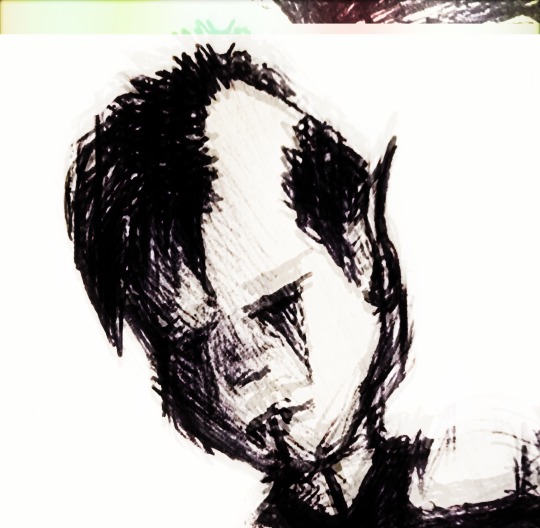
puzzling oneself,
piece by piece;
finding remedy
in the process
of coming at peace
with one's own shattered perception:
deceptive, it was.
Now, where to start?
How to assembly the pieces of oneself?
brick by brick;
There is so much life
in-between all these shrapnels.
Coming to realize:
"I was born to destroy,
just as much as I was born to create."
There has been a will
to find a way to unfold oneself,
an intrinsic will to live,
despite all objective and subjective futility.
Life will find its way.
As I wade in swamps of shrapnel,
and while I seem to dissolve
my essence will feed the patterns
that nourish life,
- the flowers, the trees, the birds,...
and my essence will return,
multiplied, feeding on its own,
by giving
and returning.
There is so much magic in the mundane,
so much beauty in the broken.
[2024/07/19]
#horror#horror of existence#existential dread#nihilism#nihilistic tendencies#futility#ptsd#horrors#piece by piece#remedy#poetry#existentialism#beauty#the magic in the mundane#poem#existentialist#life will find its way
1 note
·
View note
Text
depression isolation is all good and well until only 4 people text you for your birthday and all but one of them are your immediate family
#like it's one thing to know you're fucking up#it's another to feel it like that#i didnt even want to celebrate bc of the ongoing mental health crisis i am experiencing#causing a crushing weight of existentialist dread concerning the steady march of time#still stung like a motherfucker tho#like me @ myself you Didnt Want the attention#so whyre you being Like This#i guess i contain multitudes or whatever
2 notes
·
View notes
Text
To The Ones I Haven't Met Yet
As is with New Year traditions, I was clearing a couple of stuff from container boxes when I found the master copy of my zine from 2019, a year where some of life's greatest tragedies slowly tried to slither and slug all the way up my arm. While my work was currently being The Best One out of my career so far, I was seeking out some sense in most things around me almost philosophically, as someone with decent skill in trying to connect and see beyond people.
Whenever I see or read excerpts of the raw words I had penned right then and there, without a plan, without an outline, I think of a woman who knows and doesn't know. Of a woman who chooses to see things through juvenile lenses. She knows and yet.
I stopped producing this when the pandemic hit, and somewhere in the deepest parts of my closets probably lie the rest of the stacked photocopies. So bittersweet. Materializing this on the internet may be the only way for me to part with someone who only represents me a quarter way through, if not an eighth through.

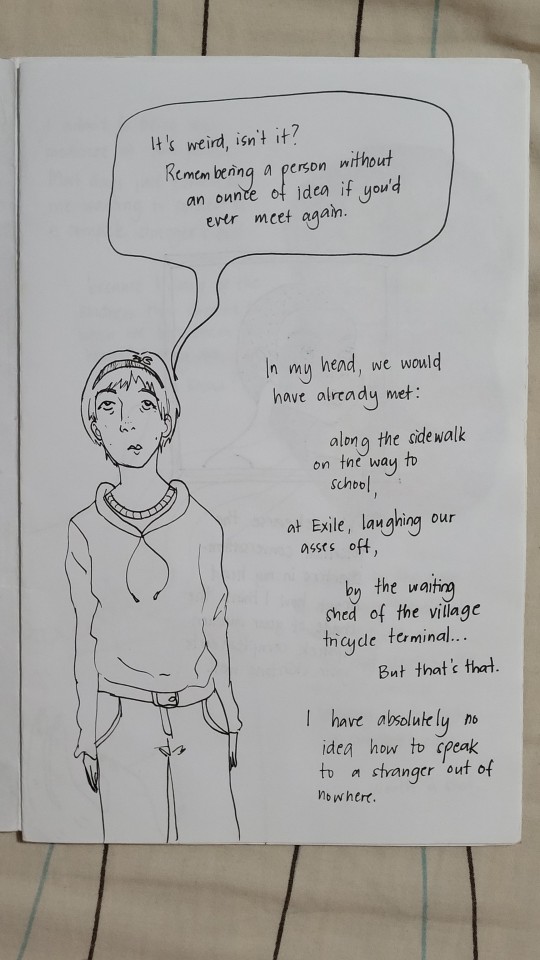
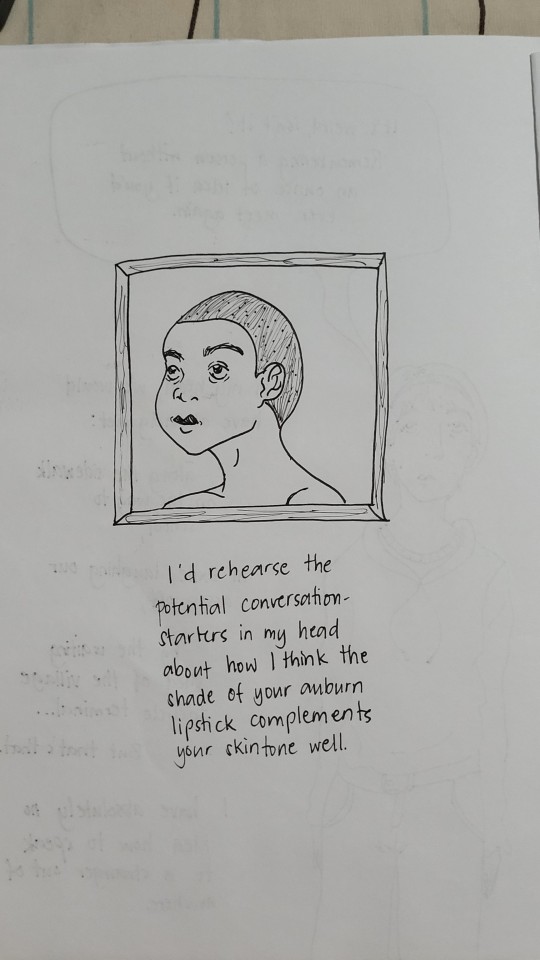
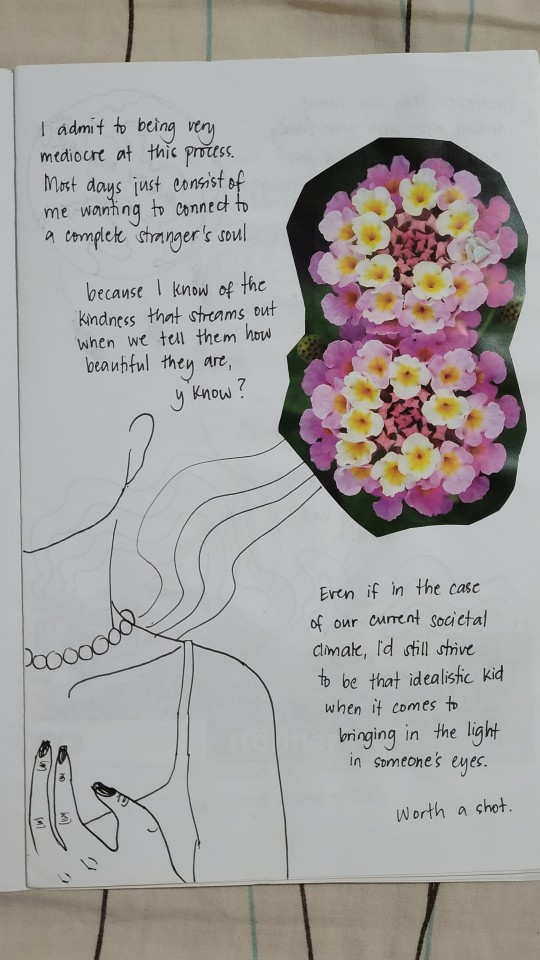
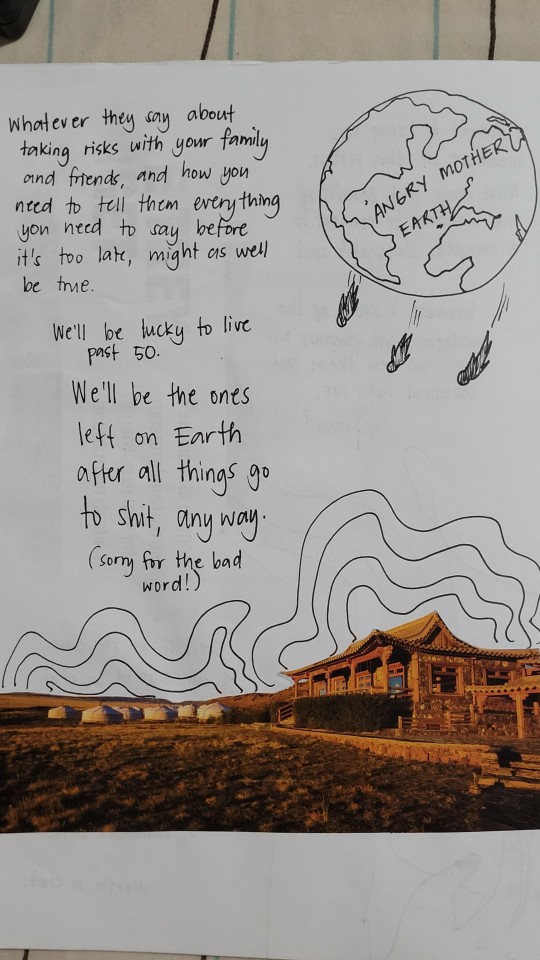
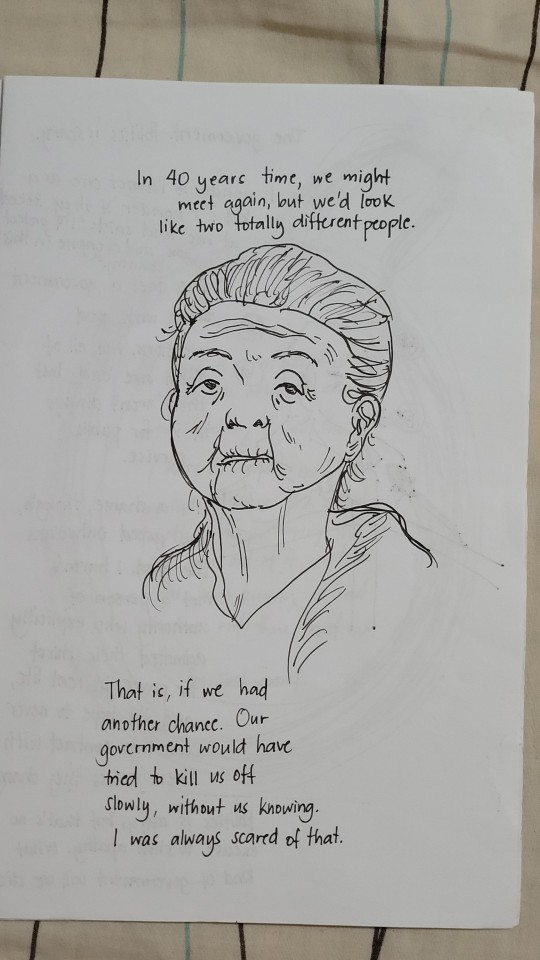
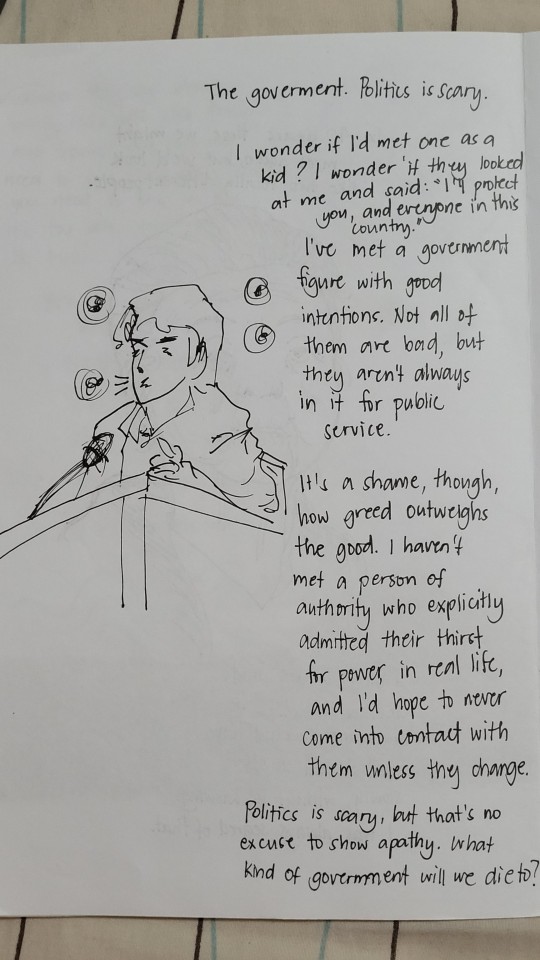
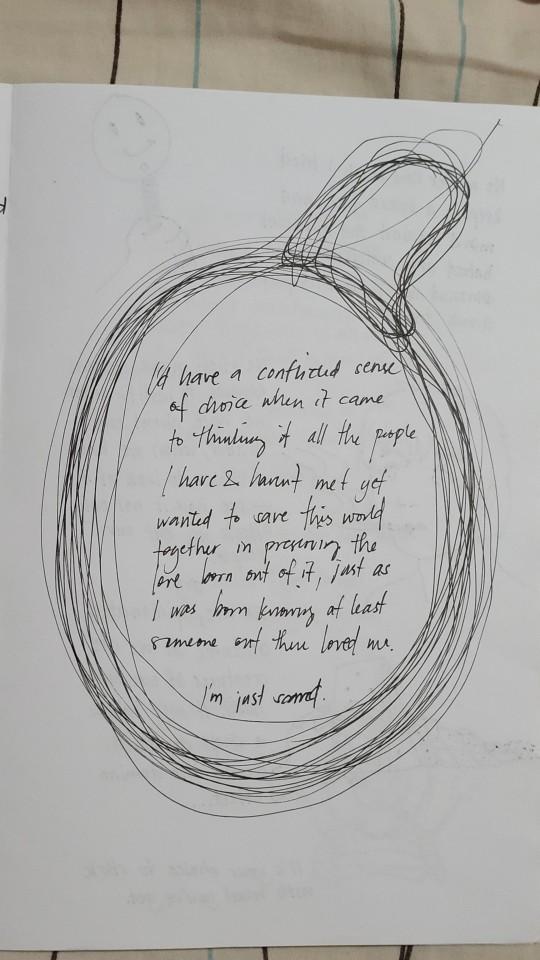
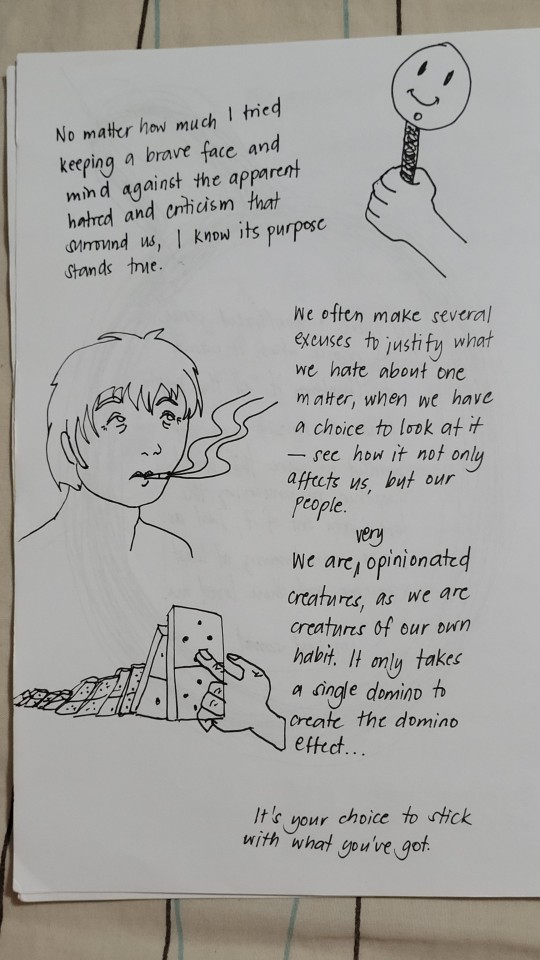
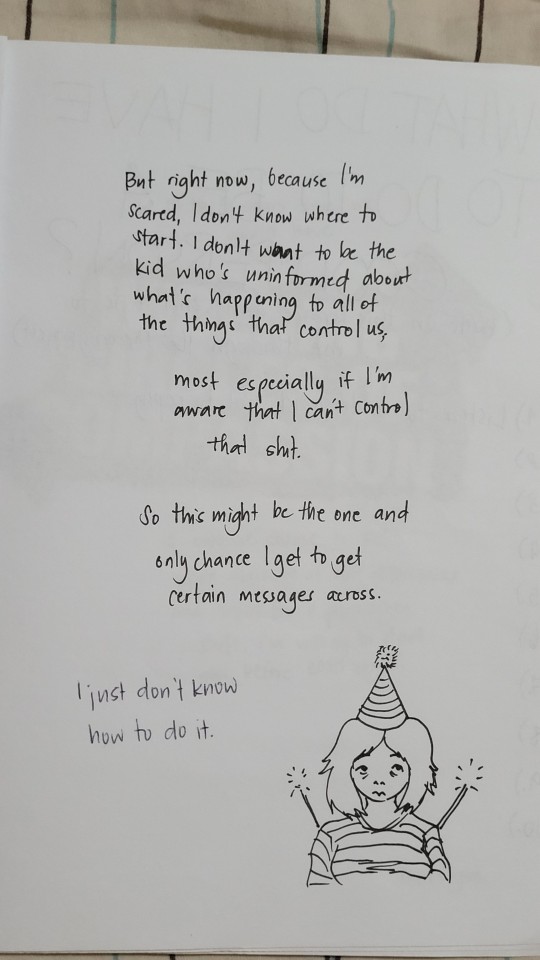
#personal#i would like to tear up now#the thing i do hate about this zine is that it's tied to one of the best professional work i've had#for a company who's very cultish#like fuck that but also#i've her to thank for for allowing me to constantly ask questions and seeking out answers#you've been fluctuating since then#especially when you've entered fandom again after making 20-minute sims episodes about existentialist dread#so THAT'S fun!!!!!!!!#also to say that i was heavily romanticizing meeting strangers for the first time in a real life setting
6 notes
·
View notes
Text
"in the remote depths, in most inward parts, in the hidden recesses of happiness, there dwells also the anxious dread which is despair..."
- Søren Kierkegaard, 𝘛𝘩𝘦 𝘚𝘪𝘤𝘬𝘯𝘦𝘴𝘴 𝘜𝘯𝘵𝘰 𝘋𝘦𝘢𝘵𝘩
photo c.2018

0 notes
Text
One thing that I really dislike about Veilguard is that (spoilers through most of act 2)
the tone of the Lighthouse crowd is so chipper, so life coach-y whereas DA sidequests in their usual way are all about death and despair and little codex entries about idk people dying alone in the dark not because of some god’s failure but because people suck and betray each other out of greed and fear. See: overarching theme of the series.
And the Crossroads are LITERALLY FALLING APART AT THE SEAMS with Solas’s guilt and regret and you can, as you poke around there, fight a Boss Champion called The Betrayal of Felassan which the Caretaker says is extremely powerful because FELASSAN and there are notes and codes entries scattered everywhere that tells a much more subtle story not just about him but about the past. But it drowns in the many variations of the same group convo circled around the topic “so Solas regrets what he did?” WELCOME TO THE MEETING ROOK, YOU ARE ONLY TEN YEARS LATE LET’S START FROM THE BEGINNING AGAIN, SHALL WE? The main narrative is trying too hard to make him a (very sexy) Trickster God of Trickery and it exhausts me when the minor things like Solas’s memories and the codex give me a much, much better character and depicts an Empire that got corrupted by its own brilliance and lack of boundaries and Solas and the likes of him being counterweights to that, forming the line that should not be crossed, questioning authority - which is ANOTHER CRUCIAL THEME FOR THIS SERIES. The subtext talks about the dangers of blind worship, of hierarchies (please remember Solas proto-anarchist takes on society in DAI, his genuine disgust at all sorts of servitude, his spite if you abuse your Herald status, his entire CHARACTER) and abuse of power, of entitlement and lack of morals. You can do this thing, but should you? That's one of the crucial things about Solas as a character too, it cuts through the best and worst of him. His greatest fear, as he tells a friendly route Rook after Blood of Arlathan, is to end up like Elgar'nan, entitled and blind. As a summary of this moral conundrum the game gives us “SO SOLAS AND MYTHAL WERE DOIN’ IT?” and Rook’s refusal to accept that is written like “ewww, not the guy in my head doing it with Mythal” like some overgrown teenager. THAT DOESN'T EVEN MAKE SENSE, ROOK?
Also, the lack of subtlety and nuance about the Veil thing drives me batty like Solas tells Rook that he had made a plan to minimize the damage done to the world when the Veil was meant to go down. No follow up for that though. Like, is that a possible option to consider? Solas says Varric wouldn’t have agreed to thousands dying (I’m really not even sure about that characterization of Varric) and Rook is meant to just let that go? Come on. I want Rook to talk to Solas - THE CREATOR OF THE VEIL - about the Veil. I am so extremely uninterested in “exchanging verbal jabs” with the Dread Wolf (I hated you so much, Purple Hawke, you were part of the reason I stayed away from the DA fandom for years) I WANT THE LORE OF THE VEIL AND ITS ACTUAL CONSEQUENCES OVER THE PAST TEN YEARS WHAT ABOUT THOSE, FEN’HAREL TELL ME WHAT YOU HAVE BEEN UP TO.
Sorry. Those were… some words.
I don’t even think Act 3 is going to solve these issues for me (NO SPOILERS), but we’ll always have fanfic, I guess. I’ll write a coda where everyone is miserable and has existentialist convos about mortality and morals and faith.
--- A friendly reminder of this DAI banter that never fails to break my heart, and tell us the truth about Solas in a less clunky way than group conversations at the Lighthouse:
Cole: You didn't do it to be right. You did it to save them.
Inquisitor: Solas, what is Cole talking about?
Solas: A mistake. One of many made by a much younger elf who was certain he knew everything.
Cole: You weren't wrong, though.
I really, really wish Veilguard's main narrative gave me a sense of wanting to depict this.
#datv#datv spoilers#solas dragon age#salty on main#absolutely not salty about solas though i would never
32 notes
·
View notes
Text
Itachi Uchiha Mental Illness - a short analysis
This is my very first post on this sub! I recently started watching Naruto in order and, as expected, I couldn’t resist diving into research about many of the characters — especially Itachi (lol).
The origin post was posted here, by myself as well.
Through this post, I want to share my thoughts on what I believe might be his mental condition, my interpretations of the character, and, most importantly, to hear your opinions and beliefs about this deeply complex figure. Let’s discuss!
“As the one who holds the tangled strings of relationships that connect the past and future, when he moves, the wheels of destiny turn.” — Uchiha Itachi, Databook Introduction
Clinical Depression
From the very beginning, Itachi’s depression felt evident to me. The more I read about his personality and way of thinking, the more it seemed like a storm that was bound to break, independent of the Uchiha massacre incident
Key Signs:
Exposure to conflicting situations since childhood

Post-war trauma

Repressive systems; family and societal pressures
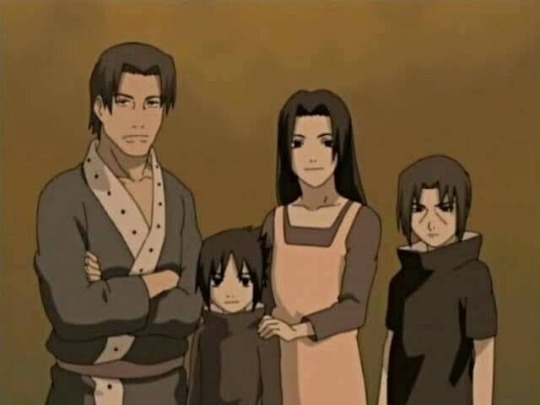
Direct exposure to suicide
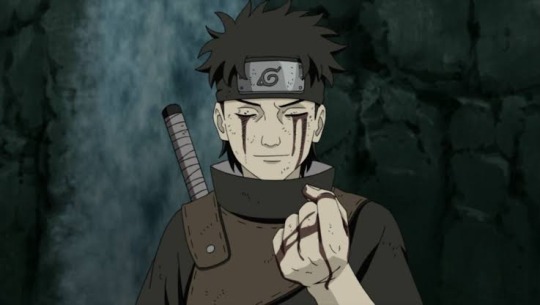
A philosophical, sensitive, and naturally introverted mindset

Nihilistic and existentialist tendencies

A repressive approach to handling emotions

Psychotic Depression
"Psychotic depression is characterized by mood disturbances accompanied by delusions, hallucinations, or both. Symptoms include sadness, hopelessness, guilt, and irritability."
"Patients may experience delusions (e.g., beliefs about having committed unpardonable sins, being persecuted, or harboring incurable disorders) and/or hallucinations, often auditory (e.g., hearing accusatory or condemning voices)."
It seems possible that Itachi’s genjutsu ability could be tied to this—perhaps as a coping mechanism to deal with the harshness of reality. While it is an invaluable tool in battle, his genjutsu also reflects his deeper philosophy. I have little doubt that this skill not only served him strategically but also symbolized his struggles with the elusive nature of truth and reality.
As [Zapenstap] analyzed:
"Itachi is an illusionist. As a genjutsu specialist, his work involves changing the perception of others. A simple genjutsu causes people to see a mirage, which renders their actions ineffective because they are “trapped” in their own minds and doing nothing in reality. However, as his skills improved, Itachi probably began to realize that genjutsu has depths much greater than the tactic to confuse an opponent. By chance he may have discovered that illusions can be more powerful than reality, and that by altering someone’s perception, he could control their actual world, and through that even change their beliefs. Ultimately, especially using the Mangekyou, he could compel others to reckon with a world of his own making.)* A revelation such as this would eventually cause a "existential" feeling of deep anxiety or dread. If Itachi can control others, then it must also be possible for others to control him. Genjutsu may be a force to reckon with in a fight, but it is magnanimously dangerous on a metaphysical level. As the student of another Sharingan user (Madara)**\*\*\*\*\*\*, Itachi would begin to question everything he knows or he thinks he knows about reality. “What is real?” How can he know that HE is not also being controlled or manipulated by a greater force?"
Itachi’s constant interplay with illusion and reality, combined with his already contemplative and burdened nature, could have exacerbated feelings of isolation, guilt, and dread, forming a cycle that defined his internal struggles.
Itachi’s existence unfolds in a perpetual dance between illusion and reality, a delicate interplay that not only reflects his contemplative and burdened nature but also amplifies his isolation, guilt, and existential dread. This endless cycle becomes the stage upon which his internal struggles are both enacted and perpetuated, shaping a uniquely harrowing relationship with himself.
His philosophy intertwines with his torment, creating a sadistic yet psychosomatic self-awareness.
Sadistic, in the sense that his acute understanding of the ninja system's inherent flaws—along with his role in perpetuating them—renders him painfully cognizant of his limitations. Despite possessing the extraordinary power to control and manipulate worlds—whether real or illusory—he remains powerless to alter the harsh truths of the actual world. It is a torment born from enlightenment, an existential irony that deepens his internal fracture.
Psychosomatic, because his inherently compassionate nature, though fractured and hardened over time, finds no refuge for the emotional storms within. The unexpressed weight of his anguish manifests physically, as if his body becomes the final repository of a soul too shattered to bear its own suffering.
Ultimately, Itachi inhabits a liminal state, teetering on the border of collapse—an emotional and physical threshold. His psyche, already fractured by the choices he was forced to make, battles against a body that can no longer endure the strain of suppressing his inner turmoil. In this fragile equilibrium, he becomes a poignant reflection of a man at war with himself, both within and without.
What do you think? Could these psychological insights align with Itachi’s character? I’d love to hear your thoughts!
#Naruto#itachi uchiha#manga#anime#uchiha#Sasuke#konoha#ninja#gengtsu#uchiha clan#Uchiha Itachi#Uchiha Itachi analysis
20 notes
·
View notes
Note
One of your recent asks got me thinking, what is going to happen when V2 eventually hits its own expiration? How will Michael feel or what could he possibly do in this scenario?
i like to think michael and v2 tend to be much more...well-prepared for this eventuality than gabriel and v1 were. they're not sure how long v2 can go, given that through hell's meddling it's essentially cheated death, but it likely also isn't forever. however, v2 is aware of this and, again contrary to v1, is much better at not getting stuck on existentialist dread and instead working on a solution to its death. they both know it may be inevitable, but in the same way v2 takes up a lot of research in helping michael maintain his body, michael learns to be quite a skilled mechanic and v2 likely becomes something of a ship of theseus with the two consistently replacing its parts (michael becomes highly adept at modifying scrap - with the help of access to heaven's forge - to copy v2's parts). this does lead v2 to question its identity at some points, stemming all the way back to its original reconstruction, but it comes to the conclusion that this may just be the nature of the machine...or perhaps of living far beyond one's life expectancy.
v2 knows its mind is the most delicate part of itself though, a perfectly balanced quantum computer that must be maintained as the core part of itself because there's no scrap that can replace it in any other machine. this was the point of failure for v1 as well, and they're pretty doubtful hell would be feeling generous a second time. in a timeline where v2 continues to survive, i like to think it's maintained itself much better than v1 and so observes all that happens with it when it dies including its subsequent resurrection, inspiring it and michael in a likely similar capacity. to build a quantum computer, but one augmented by the divine, engineered by v2 and constructed in the heavenly forge by michael with both collaborating on the alignment of the crystal structure within it. v2 understands its own configuration and how to improvement upon it, while michael's knowledge of esoteric mathematics allow them to build a computer powered by the divine. uriel's knowledge base proves invaluable for this endeavor and it takes quite some time (many, many failures in prototyping, plus likely having the realization they'll need to also construct a more heavenly shell given that this computer would melt repurposed scrap lol), but i enjoy v2 being the first divine computer. importantly, this isn't a shift like v1's, who is now essentially part angel, part machine - v2's is subtler, still entirely a machine but now running on perfect, godly equations. it almost has a hard time keeping up with itself at first but it isn't put off by it since it was once a machine that was too human, so now it's a machine too divine.
however, i will add that in the event v2 reached the end of its lifespan, i think michael would seek his comfort in the idea that he cannot possibly last forever either. he knows he will die, he knows he will reach his end too, and v2 has proven, at least in his mind, that it has a soul. he would commit it to the earth, where it was born and what it had always wanted to protect, and he would join it there when he finally felt himself wilting. maintaining his faith as he does, michael would truly believe v2 is waiting somewhere for him, that the code woven by that computer is no different from DNA, that the mind it housed, all its emotions, its thoughts, its consciousness, had given it a spark of the divine. that humanity, from god, had passed down their soul to this grandchild of creation. its place is not in heaven or hell, but somewhere he doesn't know yet, somewhere finally fully beyond the physical where it doesn't need a body or blood. he's not sure if that means he's at last given into some kind of heresy, but he will continue to pray each day, asking v2 to help guide him when he finally joins it.
#mike takes to being a mechanic very enthusiastically#and i just love them working on stuff together!!!!#with both of them ultimately like. we can make a god computer. probably.#i do like that lucifer might help too bc of his creativity#ALL IN on making v2 the ultimate machine#cake answers#v2#michael#rise and fall au
22 notes
·
View notes
Text
Solas & the meaning of life
Another day in "I can fix my fictional brooding elf boyfriend". With existentialist philosophy this time. (Warning: will talk about death in that abstract way that existentialists do.)
Existentialism will fix Solas. His whole plan is to avoid grappling with existential dread. "Modern people can't access the fade and they aren't immortal. They're not real people! All meaning is lost!" That's a textbook example of existential dread to me (maybe that's what the Dread in Dread Wolf stands for lol).
It's not a pleasant experience to have to consider the objective meaninglessness of a short mortal existence. Most of us mortals don't have a choice, so we suffer or we don't. Either way, we all die lone eventually. And Solas gets a choice on whether existence is mortal or not, so I don't blame him for doing the most to avoid grappling with the anguish.
But living forever isn't what gives life meaning either. Back when people still believed in the sanctity of eternal life (the Christian kind is what the existentialists I read wrote about), a higher power (i.e. god) gave life meaning. But one can still experience meaning from said higher power with a mortal life. But Solas doesn't strike me as somebody who would rely on a higher power in that way. (Or would he? he has Mythal, after all.)
So I wonder what he thinks gives life meaning. The fade, perhaps? Whatever it is, I think it's closely linked to spirits, despite their lack of physicality. And modern Thedosians also have access to it, since that was the center of his whole character arc in Inquisition.
I think it's interesting to think about both philosophically and for the DA lore (there's also a quick a shortcut to the Matrix, imo, but I digress). And I'm so curious to see how these ideas change after Veilguard. Maybe Rook will be Solas' Sartre lol (and Varric already did some of the work). Because the "people die, it's what they do" zinger of a line is kind of consistent with existentialist philosophy, but perhaps he wouldn't have said it that way if he was a full convert.
Anyway, I can't possibly be the only one who thought this. Wondering what other people in the fandom space think!
10 notes
·
View notes
Text

Emerging from the shadows, essence draws over everything as a curtain draws over a window.
Although, I do not miss the view, I am doleful at being stripped of the light which only the window could provide me.
I may never be able to move the curtain again. Should a miracle or some powerful mysticism happen, granting me the ability to move the curtain aside once more, the light which flows in will be new, and will never be, as it once was, familiar again.
#writeblr#my writing#academia#writing#writers on tumblr#original writing#writerscommunity#journal#philosophy#spilled ink#spilled words#my words#words#words words words#writers and poets#creative writing#my quotes#quotes#existentialism#absurdism#existential crisis#existentialist#existential dread#my post#thoughts#spilled thoughts#gothic#dark academia#romantic academia#spilled poetry
12 notes
·
View notes
Text

Hello! My name is Draven. He/him, 20 years old, from Brazil, and a writer (allegedly), currently working on a comic draft. I write queer whump mostly. My WIPs are below the page break. For the sake of everyone's safety and comfort, here are the trigger warnings that can be expected from this account. Please stay safe and mute the tags.
SA — #tw sa
Torture, gratuitous gore, body mods, bodily fluids galore — #tw body horror
Sexuality and gender (forcemasc/forcefem, do keep in mind that I'm FTM so if transfems feel fetishized please do let me know) — tw gender manipulation
Sex, violence during sex (consensual), general horniness — #tw sex
Military/war themes — #tw military
Necrophilia, dead body handling, grave desecration — #tw necro

WIPs
All my WIPs are nameless so far because I am Very Lazy and Fear Permanence. I'm currently focused on Black Tulip
Black Tulip, Zinc Garden (#WIP black tulip)
Very early stages, most of the plot points and settings are likely to change as I refine it. Set in Afghanistan, 1980s, during the Soviet invasion. The story follows primarily Nikolai (Kolya), our initial whumpee, an emotionally numb and socially stunted young soldier who's assigned to a particularly shitty unit (details are murky. Further research is needed). He meets Arseniy Lisitsin (Lisya, or Senya if you want to die ig), our initial whumper. Whumping ensues. The catch is: both characters take turns being the aggressive part, and they get increasingly creative in their whumping methods.
Trigger warnings: dubious consent, unfair power dynamics (initially), unhealthy relationships, actual war, period typical homophobic language
I will say, since whump is largely a form of entertainment and trauma release, I won't write any whump surrounding the civilians caught in the war, as I don't think that the tone of this work lends itself to depicting their trauma in a respectful way. So only soldiers will he harmed here.
Prussian Bluest (#WIP prussian bluest)
Set initially in the 1990s, but most of the whump takes place in flashbacks to WW1. The story follows Bowie (placeholder name) whose hyperfixation is on Manfred von Richthofen, the Red Baron. During a trip to Germany and Poland for the sake of his research, Bowie makes a pilgrimage through the more relevant places to Richthofen's life, including the three burial sites where he had been interred. Shenanigans ensue, Bowie causes the Baron to come back as a spirit. The story switches between them trying to figure out how to fix this mess while Manfred has to relive days of his life at random (ranging from his actual death, in which he feels the dread, the pain, the fatigue etc to his first day of school), and Manfred reminiscing over his memories. Oh also Bowie experiences psychosis so that's fun (I Will Make My OCs Have My Illnesses And You Cannot Stop Me). Cue some psychological and existentialist horror since I like that
Trigger warnings: again Actual War, psychosis inducing narratives, sexual trauma (barely showed but it's still there), queerphobia. And this last one is not a trigger but it'd piss me off so content warning for historical inaccuracies and piss poor portrayal of a historical figure
Very excited to yap with you all 🫦
7 notes
·
View notes
Text

the weeds are just as pretty as the flowers.
- madhira
#quotes#poem of the day#music#books#book quotes#bookblr#quoteoftheday#book quote#life quotes#life lessons#existentialist#existential dread#existential crisis#existentialism#existence#exist#existing#one liner#weedlife#flowers
4 notes
·
View notes
Text
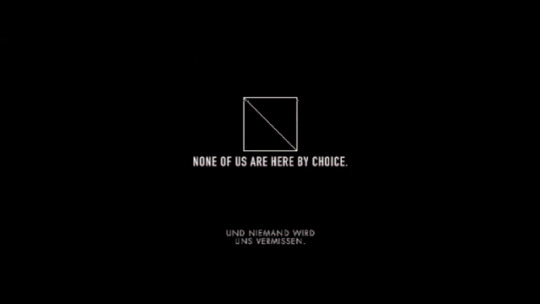

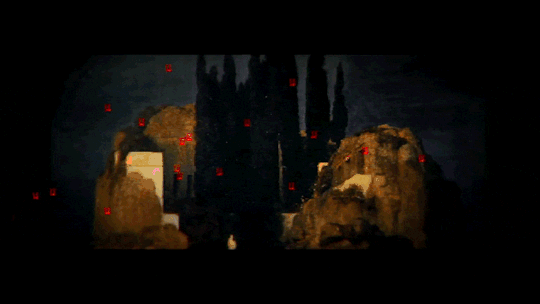
"Signalis," an indie survival horror game, draws players into a haunting, dystopian world where the line between humanity and machinery is blurred, and the concept of free will is constantly questioned. Central to the game's narrative is the phrase "None of us are here by choice," a powerful statement that encapsulates the existential themes of the game. This analysis will delve into the implications of this phrase, exploring how it reflects the characters' struggles with agency, identity, and the oppressive systems that govern their lives.
Choice and Agency: "Signalis" immerses players in a bleak, retro-futuristic world where characters, primarily synthetic beings with human-like qualities, are trapped in a cycle of duty and survival. The phrase "None of us are here by choice" serves as a thematic cornerstone, suggesting that the characters’ presence in this world, and their roles within it, are dictated by forces beyond their control. This lack of choice highlights the game's exploration of agency—whether the characters, or by extension the players, have any true autonomy in their actions or are merely following predetermined paths.
Transition to the Loss of Identity and Free Will: As players progress through "Signalis," the narrative reveals that the characters, particularly the protagonist, struggle with a fractured sense of identity. They are synthetic beings, engineered to serve specific purposes, with memories and emotions that may not be their own. This artificiality strips them of the ability to choose their paths in life, as their actions are heavily influenced, if not entirely dictated, by their programming and the roles imposed upon them. The statement "None of us are here by choice" thus resonates with the characters’ existential dread, as they grapple with the realization that their sense of self and autonomy might be nothing more than an illusion.
The Oppressive Systems and Lack of Choice: The world of "Signalis" is governed by a cold, bureaucratic regime that views its synthetic inhabitants as tools to be used rather than beings with agency. This oppressive system further reinforces the notion that none of the characters are present by choice. They are created, assigned roles, and expected to fulfill their duties without question. The game’s environment—a series of bleak, industrial landscapes filled with broken machinery and lifeless corridors—reflects the dehumanizing nature of this system. The absence of choice becomes a pervasive element, driving home the sense of entrapment and futility experienced by the characters.
The Psychological Impact of Lack of Choice: The realization that their lives are devoid of true choice has a profound psychological impact on the characters in "Signalis." This theme echoes existentialist ideas, particularly those of Jean-Paul Sartre, who argued that the recognition of one’s lack of control can lead to a crisis of identity and meaning. The characters' struggles with their roles, the haunting repetition of their tasks, and the oppressive nature of their environment all contribute to a deep sense of despair and nihilism. The phrase "None of us are here by choice" becomes a mantra that underscores the game’s exploration of these existential anxieties.
The Enduring Significance of Choice: "Signalis" is a game that uses its haunting narrative and atmospheric design to delve into the complexities of choice, or rather, the absence of it. The phrase "None of us are here by choice" encapsulates the characters’ struggles with agency, identity, and the dehumanizing systems that control their existence. Through its exploration of these themes, the game offers a profound commentary on the nature of free will and the psychological toll of living in a world where choice is an illusion. This analysis highlights how "Signalis" uses its narrative to challenge players to reflect on their own perceptions of agency and the systems that shape their lives, making it a deeply introspective and thought-provoking experience.
#Signalis#None of us are here by choice#ExistentialHorror#DystopianGames#SciFiHorror#PsychologicalHorror#DigitalExistentialism#ExistentialDread#NoFreeWill#Pixel Crisis
12 notes
·
View notes
Text
@crimsonrobed continued from (x)
One of the two books, neither alike in dimensions nor colour yet bearing the same faded author’s name on their fronts and the same titles listed in their internal indexes, lay open on the small square table situated between the velvet chairs. Tastefully worn about the seat and armrests they both were, but nonetheless richly coloured and centre like the modest library’s crowning jewels. Rows and rows of brilliantly mismatched volumes cluttered the shelves, stretching from steady modern bindings and the odd well-loved paperback to threadbare cloth and conditioned leather; satin ribbons stuck out from underneath spines or at the top like whimsical feathers; bookmarks lay systematically scattered; stained edges and wonderfully decorated covers stood on display facing the room. Barely a wall peeked out from behind gilt frames tucked in between the tall, dark shelves. Marius looked around as he pondered. Black printed letters against ivory-aged pages and a fine dusting of thoughtful pencil marks formed the words and annotations to Keats’ Ode on Melancholy, one of five such odes written in the spring of 1819 and the last they ventured for their private, entirely unintentional however delightful bookclub. A fine choice of Louis’, and not the least unexpected. The short piece, a mere three stanzas surviving past publishing of the original four, addressed the reader directly in that flowing vocabulary to the Romantic period steeped in referenced to Greek myths, while playing on the poet’s intimate knowledge of nature’s poisons. “I find it’s strangely uplifting,” he said finally, “encouraging. It considers Melancholy through a very modern eye, not as a physical ailment to be cured but as an emotional state and inherent part of life, without which beauty and depth of one’s overall feeling would be lessened, if not lost altogether. Judging by the negative grammar and word choice throughout the first stanza, it sound like it should form a gloomy piece, but it’s not.”
There is a softness in the very air around them as they settle into their little nook within the vast, sprawling shelves. It's quiet here; away from the chatter, away from prying minds, and away from all the noises of the waking mortal world around them. He knows these shelves like he knows himself— perhaps even better. How many hours had he spent tucked away with his precious collections, painstakingly stalking back and forth to stock each shelf from scratch, dreading over which authors to place where, how to arrange each special edition, the Romantics versus the Modernists, the Existentialists versus the Symbolists. It was the only room in this house designed by his own two hands.
Armand had given him the open space, gifted him with beautiful copies in polished leather, but it was Louis who took care to curate every inch to his liking.
Strange, to have Marius here.
Not bad— the opposite, in fact. His very presence strikes some hyper-awareness in Louis as he follows the other's gaze around the room, wonders what the great Marius might see that Louis himself cannot. Is he impressed? Is he underwhelmed? Can he sense which books were gifted from Armand, which were stolen from Lestat, which were picked up from the corner store just around the block from the house on Rue Royale?
"Uplifting, yes. That's exactly it," he breathes as the poetry comes back to him. Lines inscribed on his very heart made new again by the silver twang of Marius' voice.
"The negative grammar places the narrator beside the reader. It starts as if the narrator means to warn you against some grave danger that only he knows, but by the end you realize...you realize that he is beside you. That he has been beside you this entire time...propelling you out of of your own grave."
Silence, for a moment, as Louis considers his own words, feels the weight of Marius' gaze upon him.
"He understood. He understood."
7 notes
·
View notes